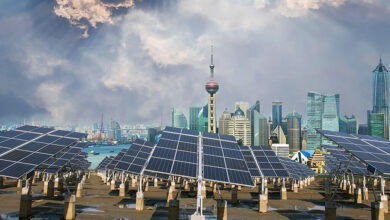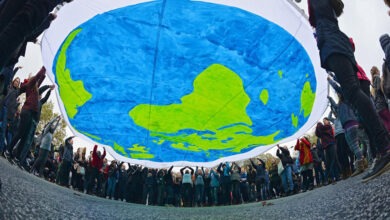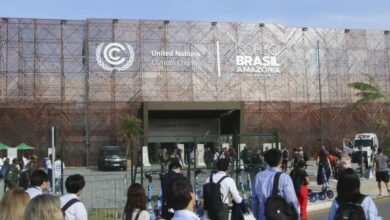What the world wants from COP28

By Sheikha Suhaila Fahad Al-Sabah
Managing Editor
Less than a week away from the start of the 28th Conference of Parties (COP28) on Climate Change in Dubai, there is palpable concern among many climate stakeholders that this conference too could go the way of so many other COP climate gatherings in the past. The fear is that COP28 could once again prove to be nothing more than a talkshop, with lengthy discussions, plenty of promises, and at the end very little in the form of meaningful measures to address climate change.
The question is, does the world have the luxury of time to let yet another opportunity slip by without resolutely and effectively addressing climate change? Can the world allow COP28 to become ‘one more’ ineffectual climate gathering that fails to credibly cut global greenhouse gas (GHG) emissions, to decisively reduce fossil fuel usage and production, and to provide the needed technological and financial support for countries in the Global South to tackle climate consequences?
Our apprehension on the upcoming talks arise from having attended and covered several previous climate discussions, which have been, in the most part, unfructuous gatherings, despite the highly publicized ‘achievements’ made at the conclusion of the talks. Even the much touted ‘Loss and Damage Fund’, the key achievement of last year’s COP27 has so far failed to deliver on its promise.
The Fund, which was set up to help impoverished developing countries to mitigate and adapt to climate change with funding from developed countries, materialized through persistent efforts and last-minute negotiations by Egypt’s COP27 Presidency and other stakeholders. Despite those efforts and the passage of a year, the Loss and Damage Fund has made very little progress. More importantly, there has been no significant cash flow into the Fund from the developed economies — responsible for much of the GHG emissions in the past.
Since the 2015 groundbreaking COP21 in France, at which the seminal international treaty on climate change, the Paris Climate Accords was adopted, subsequent COP gatherings have largely centered around achieving the main objectives of the Paris Agreement — holding global average temperature to below 2ºC, while pursuing efforts to limit the rise to 1.5ºC above pre-industrial era levels; helping countries adapt and build resilience to climate change; and marshaling finance to support low GHG emissions and climate-resilient development in developing countries.
Mitigating, adapting and financing climate change will continue to be the mantra at COP28. But the hope is that the Dubai conference would be an outlier from past such gatherings by driving momentum away from previous ‘talking’ phases towards an Implementation phase that initiates processes designed to achieve the main goals of the Paris Agreement.
COP28 is also important in that it will herald the conclusion of the first-ever global stocktake (GST), a mechanism that allows countries and stakeholders to assess their progress, or lack thereof, in meeting the goals of the Paris Agreement. Negotiators at COP28 will also be seeking common ground on wording a framework on the global goal on adaptation (GGA), as well as pushing for, or resisting, as the case may be, the operationalizing of the Loss and Damage Fund.
Other issues that will be in focus across several negotiating streams during the two-week-long COP28 include energy transition, food systems transformation, and enhancing water scarcity — a theme ardently advocated by the COP28 Presidency of UAE. But, as is often the case at these climate talks, discussions and negotiations on all issues and themes will eventually boil down to financing climate change.
Considering that emissions from the burning of fossil fuels, mainly coal, oil and gas, are responsible for catalyzing climate change, it is surprising that there has been no direct reference to the role of these fuels at past COP gatherings. The first ever reference to these fuels was in the cover decisions released at COP26, which called for accelerating “efforts towards the phasedown of unabated coal power and phase-out of inefficient fossil fuel subsidies”.
To clarify, unabated coal refers to coal power plants that produce coal without the use of abatement technologies such as Carbon Capture and Storage (CCS). As per the COP26 statement coal produced using CCS is apparently exempt from being phased down. Moreover, the statement makes no mention of phasing down oil or gas, but only on phasing out subsidies on these fuels.
At COP27, a coalition of over 80 countries pushed for the COP26 language on coal to be expanded to include all fossil fuels. Although such a reference did not make it into the formal decision text, the growing chorus to phase out fossil fuels is increasing pressure on the UN Climate Change secretariat to address this key issue. Climate activists and media have attributed the long silence on fossil fuels at COP gatherings to the money power wielded by the fossil fuel industry, and to the increasing presence and influence of fossil fuel lobbyists at COP talks.
The topic of phasing out fossil fuel is unlikely to garner much attention at COP28. Despite a synthesis report on the GST highlighting the need to phase out unabated fossil fuels there is no dedicated negotiation track set aside for discussing this in Dubai. Climate activists also voice concern that a focus on reducing only unabated fossil fuels, or on cutting emissions from fossil fuels, may detract attention from what is actually needed — phasing out production and use of all fossil fuels.
A recent report by UK-based international think-tank Chatham House underscored the importance of COP28 to the world. The report noted that discussions on the first Global Stocktake at COP28 are crucial as they provide a platform to assess the collective progress the world has made towards achieving the goals and purpose of the Paris Agreement, as well as areas where progress is still wanting. The stocktake will also guide governments on how to strengthen action, support and international cooperation on climate change.
The report explained the GST consists of three components that are structured to build on one another. The first phase that began at COP26 in 2021 focused on gathering and synthesizing information on climate change and climate action from governments, international organizations, scientific institutions, civil society organizations, and other stakeholders.
Drawing on the material received in the first phase, the second phase, or technical component of GST that began in 2022, took stock of progress made in implementing the Paris Agreement and identified opportunities for strengthening action, support, and international cooperation on climate change. The technical dialogue was facilitated by a pair of co-facilitators, each from a developed and a developing country.
In September of this year, a synthesis report containing key messages and recommendations from the second technical phase of GST was released. The synthesis report showed that although the Paris Agreement galvanized climate action globally and significant progress has been made since, much more must be done to bring implementation of climate change back on track.
The third and final component of the GST is the ‘political phase’ that will now take place at COP28. During this phase, governments will discuss and consider the findings of the GST’s technical phase, and the synthesis report, and what these mean for strengthening climate action. To do this, a series of high-level events will be convened at COP28, aimed at generating key political messages, and negotiating a decision or declaration.
The COP28 gathering is also slated to adopt a framework for achieving a global goal on adaptation (GGA) as indicated by the Paris Agreement. The GGA is intended to focus efforts by countries to enhance adaptive capacity, strengthen resilience and reduce vulnerability to climate change. The Paris Agreement did not clearly define the goals to be achieved, as such, Governments at COP28 will need to both clarify the goal and set up mechanisms to measure progress in this regard.
However, the key area that will need resolving at COP28 is financing climate change. In 2021 at the COP26 in Glasgow, UK, developed countries pledged to double adaptation finance from 2019 levels by 2025. Despite this pledge, finance currently available for adaptation is far less than what is required today, and even the pledge to double adaptation financing by 2025 will be inadequate to meet future needs.
To put this adaptation need in perspective, in 2022, the UN Environment Programme estimated that the annual adaptation needs of developing countries to be US$160-340 billion by 2030 and $315-565 billion by 2050. While this funding may appear to be a considerable outlay, it is only a trifling compared to global subsidies granted to fossil fuel production — the International Monetary Fund (IMF) estimates that in 2022, the world spent over $7 trillion in fossil fuel subsidies.
Addressing climate change-induced loss and damage will also feature prominently during negotiations at COP28. Governments will need to agree on how to operationalize the Loss and Damage Fund and on key aspects of the funding. When the fund was agreed upon at COP27 several critical questions were left unresolved, including how broad its focus should be; which countries are eligible for support; and where the money should come from. These questions and others will need to be answered in Dubai.
Notwithstanding the incongruity of holding the COP28 climate conference in a country that is one of the biggest producers and exporters of fossil fuels, this could be the world’s best chance to reach consensus on addressing climate change, or at least some aspects of it. The region’s petro-states could find it expedient to combine their influence and money power to bridge some of the intractable issues that have stalled previous climate talks, especially those related to finances.
There is a growing awareness among Gulf states that no country is insulated from the risks of climate change, and they need to prepare for the day after oil. In what could be a reflection of this changing trend, the COP28 president-designate, Dr. Sultan al-Jaber was recently quoted as saying that the phasedown of fossil fuels was ‘inevitable’ and ‘essential’. His words are of import; Dr. Al-Jaber is also the CEO of his country’s national oil company, Abu Dhabi National Oil Company — one of the world’s largest oil producing companies.
Our exposure to previous COP meetings may have jaded our outlook on these talks, but we sincerely hope that the two-week-long COP28 in Dubai will prove to be different from previous climate talks, and will deliver ‘real achievements’ on climate change for the future of our world, its environment, and all its species.












